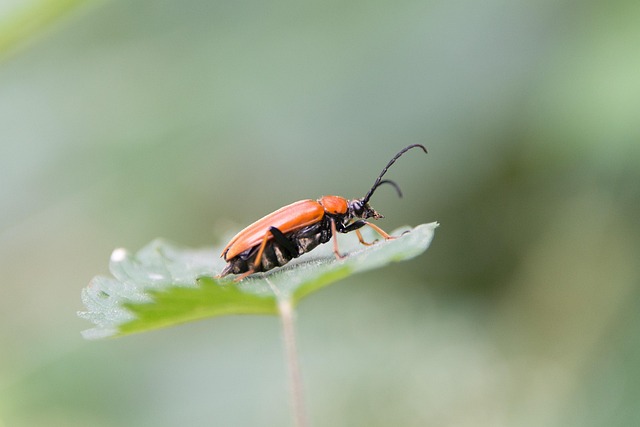Carpet beetles, tiny but destructive, thrive in warm, humid homes. Preventative measures like regular cleaning and low humidity are key to eco-friendly carpet beetle control. Natural repellents, heat treatments, and non-toxic insecticides offer humane solutions while safeguarding humans, pets, and the environment. A holistic approach combining natural predators, essential oils, deep cleaning, and proper ventilation ensures long-term protection without toxic chemicals.
In the pursuit of a harmonious home environment, understanding and managing carpet beetles becomes essential. This article explores humane and eco-conscious approaches to mitigate these pesky intruders. We delve into their behavior, life cycle, and present a range of effective, green solutions for homeowners. From preventive strategies to professional treatments, we offer both short-term relief and long-term, sustainable management practices. Discover how to eliminate carpet beetles without compromising your home’s ecological balance, embracing eco-friendly carpet beetle solutions along the way.
Understanding Carpet Beetles: Behavior and Life Cycle
Carpet beetles, despite their name, aren’t actually related to regular beetles and belong to a distinct family. They are small, typically measuring less than 1/8 inch (3 mm), and come in various colors from black, brown, and red to more unique shades like green or purple. These insects play a crucial role in the ecosystem as decomposers, feeding on dead plant material. However, when they infiltrate homes and buildings, especially those with carpets, they can become a significant pest due to their ability to cause damage to fabrics, textiles, and even wooden structures over time.
Understanding carpet beetles’ behavior is essential for adopting eco-friendly solutions. They have a complete life cycle, passing through four stages: egg, larva, pupa, and adult. The larvae are the most destructive, feeding on carpets, upholstery, and other organic materials. They prefer warm, humid environments, making them common in areas with poor ventilation or water damage. By recognizing these behaviors, homeowners can implement preventive measures and choose eco-friendly treatments, such as regular cleaning, natural repellents, and targeted, non-toxic insecticides, to manage and eliminate carpet beetle infestations effectively while minimizing environmental impact.
Eco-Friendly Prevention Strategies for Homeowners
To prevent carpet beetles in an eco-friendly manner, homeowners can take several proactive steps. Start by regularly cleaning and vacuuming floors and upholstery to remove any debris or larvae that may be present. Vacuum cleaners with HEPA filters are ideal as they capture and retain allergens and small particles, reducing the risk of beetle spread. Another effective strategy is to maintain low humidity levels in your home. Carpet beetles thrive in moist environments, so using dehumidifiers in humid areas like basements or bathrooms can deter their presence. Regularly inspecting for any signs of an infestation early on is crucial. Look out for tiny holes in fabrics, silk, or carpet fibers, which could indicate a beetle presence.
Eco-friendly prevention also involves being mindful of the materials you bring into your home. Avoid bringing in secondhand furniture or fabrics unless they’re clean and free from any pests. Opting for natural, plant-based cleaning products instead of chemical-laden ones can also help create an unfavorable environment for carpet beetles. Additionally, maintaining a healthy indoor ecosystem by promoting beneficial insect populations through gardening practices can naturally keep beetle numbers in check.
Professional, Humane Treatment Options
When dealing with carpet beetles, professional, humane treatment options offer an effective and eco-friendly approach. Instead of resorting to harsh chemicals, experts in pest control employ targeted methods that minimize environmental impact while ridding spaces of these pests. One such method involves using natural repellents like lavender, cedar oil, or neem oil, which are known to deter carpet beetles without causing harm to humans or pets.
Professionals also utilize heat treatment, a non-toxic solution where heated air is circulated in affected areas to dehydrate and eliminate adult beetles and their larvae. This method is particularly useful for preserving valuable textiles and carpets while ensuring the well-being of the environment and inhabitants. Eco-friendly carpet beetle solutions are not just a trend but a necessary shift towards sustainable practices, reflecting a commitment to both conservation and human safety.
Long-Term Solutions: Sustainable Management Practices
Implementing long-term, sustainable management practices offers a holistic approach to addressing carpet beetle infestations while mitigating environmental impact. Instead of relying on toxic chemicals, focus on eco-friendly solutions that target specific needs. Natural predators like spiders and ants can be encouraged to inhabit areas prone to beetles, helping to keep populations in check. Utilizing essential oils and plant-based repellents not only deters beetles but also provides a safer alternative for both humans and pets compared to synthetic insecticides.
Regular deep cleaning and proper ventilation are key components of sustainable carpet beetle management. Regularly vacuuming floors and upholstery removes adult beetles, larvae, and eggs before they have a chance to breed. Adequate air circulation helps reduce moisture levels, creating an unfavorable environment for beetles to thrive. These practices, combined with natural remedies, create a robust defense against carpet beetles while promoting a healthier indoor ecosystem and minimizing environmental harm.
In addressing carpet beetle management, a shift towards humane and eco-conscious methods is both necessary and achievable. By understanding the behaviors and life cycles of these pests, homeowners and professionals alike can implement effective, non-toxic prevention strategies. Adopting sustainable practices ensures a healthier environment while effectively controlling beetle populations. Eco-friendly solutions, ranging from natural repellents to innovative long-term management techniques, offer a promising path forward, allowing us to coexist harmoniously with these creatures without causing harm to our planet.
